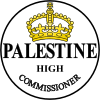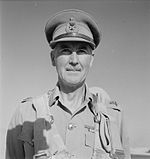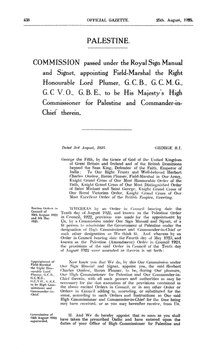| High Commissioner of Palestine and Trans-Jordan | |
|---|---|
 Badge of the high commissioner of Palestine Badge of the high commissioner of Palestine | |
 Flag of the high commissioner of Palestine Flag of the high commissioner of Palestine | |
 Alan Cunningham, the Alan Cunningham, thelast high commissioner for Palestine and Transjordan | |
| Style | His Excellency The Right Honourable |
| Residence | Jerusalem |
| Appointer | Monarch of the United Kingdom |
| Formation | 1 July 1920 |
| First holder | Sir Herbert Louis Samuel |
| Final holder | Sir Alan Cunningham |
| Abolished | 14 May 1948 |
The high commissioner for Palestine was the highest ranking authority representing the United Kingdom in the mandated territories of Palestine, and the high commissioner for Transjordan was the highest ranking authority representing the United Kingdom in Transjordan. These posts were always held simultaneously by a single individual after the high commissioner for Transjordan was established in 1928.
The British representative to Amman was "responsible to the high commissioner in his role as representative of the mandatory power, but not in his capacity as head of the Palestine administration."
They were based in Jerusalem. The office commenced on 1 July 1920, before the commencement of the Mandate on 29 September 1923, and replaced the British military occupation under the Occupied Enemy Territory Administration, which had operated in Palestine in 1917–1918. The office ceased with the expiration of the Mandate on 15 May 1948.
When the office of high commissioner was vacant, or the high commissioner was unable to perform his duties for some reason, a person who was usually the chief secretary of the government of Palestine was appointed to perform the same duties with the same powers.


List of high commissioners for Palestine and high commissioners for Trans-Jordan
| Portrait | Name | Term start | Term end |
|---|---|---|---|

|
Sir Herbert Louis Samuel | 1 July 1920 | 30 June 1925 |

|
Sir George Stewart Symes (acting) |
2 July 1925 | 25 August 1925 |

|
Field Marshal Lord Plumer | 25 August 1925 | 31 July 1928 |

|
Sir Harry Charles Luke (acting) |
31 July 1928 | 6 December 1928 |

|
Sir John Chancellor | 6 December 1928 | 3 September 1931 |

|
Sir Mark Aitchison Young (acting) |
3 September 1931 | 20 November 1931 |

|
General Sir Arthur Grenfell Wauchope | 20 November 1931 | 1 March 1938 |
| William Denis Battershill (acting for multiple periods) |
21 June 1937 | 3 March 1938 | |

|
Sir Harold MacMichael | 3 March 1938 | 30 August 1944 |
| John Valentine Wistar Shaw (acting) |
30 August 1944 | 31 October 1944 | |

|
Field Marshal The Viscount Gort | 31 October 1944 | 5 November 1945 |
| John Valentine Wistar Shaw (acting) |
5 November 1945 | 21 November 1945 | |

|
Lieutenant General Sir Alan Cunningham | 21 November 1945 | 14 May 1948 |
See also
References
- Mary Christina Wilson (28 June 1990). King Abdullah, Britain and the Making of Jordan. Cambridge University Press. pp. 73–. ISBN 978-0-521-39987-6.
For example, his desire that Transjordan be totally dissociated from Palestine was accomplished by the fine distinction of making Philby responsible to the high commissioner in his role as representative of the mandatory power, but not in his capacity as head of the Palestine administration. (Privately, London held the reservation that 'the door would not be closed to a possible rapprochement between the two administrations in the future.)
- The Palestine Order in Council, 1922, Clause 7.
- ^ Gazette, 3 September 1931
External links
- Report to the League of Nations on the Administration of Palestine and Trans-Jordan for the year 1928
- World Statesmen - Israel
- Agreement between his Britannic Majesty and His Highness the Amir of Trans-Jordan, February 1928 Article 1, "His Highness the Amir agrees that His Britannic Majesty shall be represented in Trans-Jordan by a British Resident acting on behalf of the High Commissioner for Trans-Jordan."
- Herbert Samuel and the British Mandate for Palestine: the Formative Years on the Israel State Archives website
| Mandatory Palestine articles | |||||
|---|---|---|---|---|---|
| History | |||||
| Geography | |||||
| Politics | |||||
| Security | |||||
| Economy | |||||
| Culture |
| ||||
